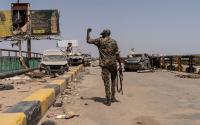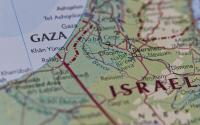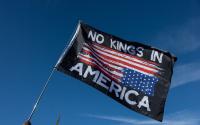by John R. MacArthur
Imagine we're back in October 1962, at the height of the Cold War, in the thick of the Cuban Missile Crisis. The world's survival is at stake, threatened by the real possibility of nuclear war between the two superpowers, neither one prepared to concede an inch.
Then imagine this scene: The terribly tense Security Council debate is under way between the Soviet and U.S. representatives to the United Nations. Suddenly, just after Soviet Ambassador Valerian Zorin begins to speak, his American counterpart, Adlai Stevenson, rises and walks out of the room, leaving two note takers behind. Imagine further that the pretext for the walk-out is Zorin's supposedly "terrorist" youth and the Soviet refusal to allow foreign inspectors into its nuclear facilities.
No doubt you would find such undiplomatic behavior at best shortsighted -- at worst, purile, provocative, and dangerous. No doubt even some of the most anti-communist journalists would criticize American arrogance and immaturity.
So I found myself shocked by the lack of public comment last month following America's de-facto boycott of two provocative U.N. speeches by the new president of Iran, Mahmoud Ahmadinejad. Of course, no two historical events are perfectly analogous, but if we take seriously the Bush administration's warnings about "extremist" Iran and its nuclear-development program, then we can certainly draw a comparison. Bush would have us believe that Iran poses an extraordinary danger to the world -- different, to be sure, from the one posed by Moscow in the 1960s, but grave nevertheless. Why snub the new Persian president at the very moment when negotiation appears urgently necessary?
Granted, the administration never had much use for the U.N., even before January 2002, when Paul Wolfowitz and company inserted Iran in the "Axis of Evil," with Iraq and North Korea. The neo-conservative unilateralists around Bush have long held in contempt the World War II-era institutions created by the Roosevelt and Truman administrations for the advancement of world peace. When John Bolton joked in 1994 that it wouldn't matter if the U.N. Secretariat lost 10 floors, he was merely saying publicly what his more polite kennel-mates were growling in private.
Moreover, Bush's jaundiced views on world government aren't so radically different from some of his predecessors'. Other presidents have viewed the "Workshop for Peace" on the East River as an unavoidable annoyance, not a real tool for diplomacy.
Such was certainly the case in the fall of 1962, when the ultra-macho John Kennedy found himself confronted by Nikita Khrushchev, just then emboldened by the CIA/Cuban exiles' failed invasion at the Bay of Pigs. Kennedy's immediate circle was divided between hawks (ancestors of Wolfowitz, who wanted to launch a pre-emptive surprise attack on the Soviet nuclear-missile sites in Cuba) and the moderates (who preferred to go slower and buy time with a naval blockade of Soviet ships). But nobody, apart from the profoundly lucid George W. Ball, thought enough of Adlai Stevenson or the U.N to give Stevenson any genuine responsibility for resolving the crisis.
On the other hand, despite his family's disparagement of Stevenson and his fancy phrases, JFK didn't muzzle his man at the U.N., and never seriously considered removing him from the debate with Zorin. Which was wise: Stevenson performed brilliantly on the floor of the Security Council when strong rhetoric was badly needed. Having heard out Zorin's phony denials about the existence of the missiles, the great liberal from Illinois demolished his Russian opponent with words, not silence.
When Zorin refused to answer the direct question of whether, in fact, the Soviets had placed missiles in Cuba, Stevenson delivered these famous lines: "You have denied that they exist. I want to know if I understand you correctly. I am prepared to wait until hell freezes over, if that's your decision. And I am also prepared to present the evidence in this room."
Stevenson's eloquence carried the day, and yielded an important psychological victory -- not only at home, but also in Western Europe, where opinion on U.S. and Soviet foreign policy was deeply divided. It was Stevenson, not Kennedy, who presented the honest, forceful public face of the United States during that highly dangerous period. Imagine the outcome if current U.S. Ambassador Bolton had been that face, instead.
In private, Stevenson was caricatured and ridiculed by the Kennedy entourage as a namby-pamby liberal -- but in the end, his main suggestion (said by Ball to be unoriginal), of offering to remove U.S. nuclear missiles from Turkey in exchange for Soviet withdrawal of the Cuban missiles, became the lynchpin of the secret agreement between Kennedy and Khrushchev that ended their stalemate.
Stevenson also proposed -- clairvoyantly and unsuccessfully -- that Kennedy offer a U.S. pullout from Guantnamo is synonymous with a brutal, authoritarian America, don't we wish that JFK had taken up the idea?
True, only a naif would believe that the U.N. -- corrupted a thousand times over by superpower intransigence and its own bureaucracy -- can function as the principal arena for solving the world's problems. And I'll concede that the Iranians are themselves fanning the flames of nuclear confrontation; they cynically exploit Bush's bullying tactics to excite nationalist passions back home, while they play cat-and-mouse with the U.N. International Atomic Energy Agency, in Vienna. Now things are heating up and the IAEA has taken a major step toward referring Iran to the Security Council for possible sanctions.
But all the while, Ahmadinejad can legitimately say, Look how the Americans insult us. They won't let us become a nuclear power in our own right. They lie about my involvement with the hostage taking in 1979, and they even threatened to deny me a visa to attend the U.N. summit.
It's almost always better to talk face to face with, or at least listen to, your adversaries. It was downright childish for two lower-level U.S. diplomats, Gerald Scott and Goli Ameri, to get up from their seats and walk out on Ahmadinejad's first U.N. speech. Rick Grenell, of the U.S. mission, told me I shouldn't infer anything from their departure, and that the two note takers left behind were "higher-ranking Foreign Service officers" than the ones who had left. But he refused to tell me their names, his voice rising with a juvenile indignation, in keeping with Bolton's crude sense of humor: "We don't give out names and I can't tell you why."
I guess we shouldn't be suprised that our "diplomacy" has sunk to the vernacular of a grammar-school playground. After all, the president himself asked Condoleezza Rice for permission to go to the bathroom.
John MacArthur, a monthly contributor, is publisher of Harper's magazine.





